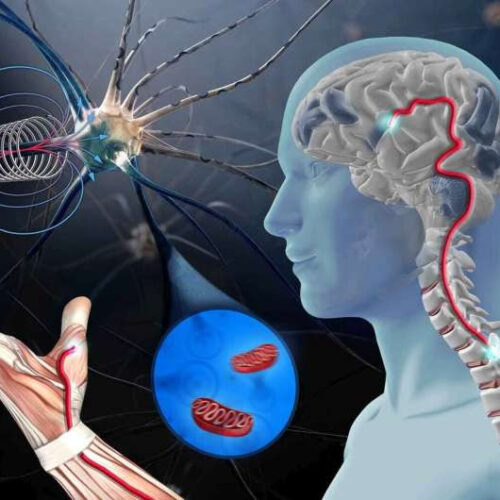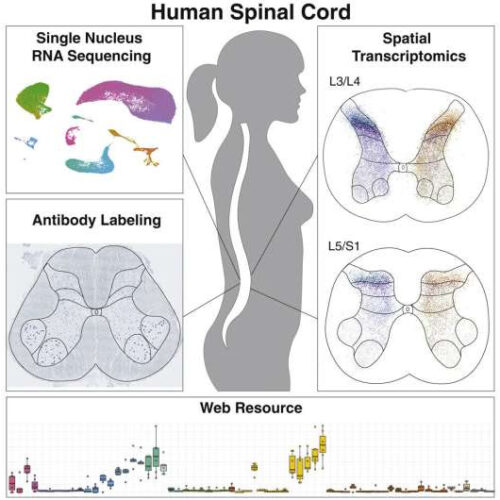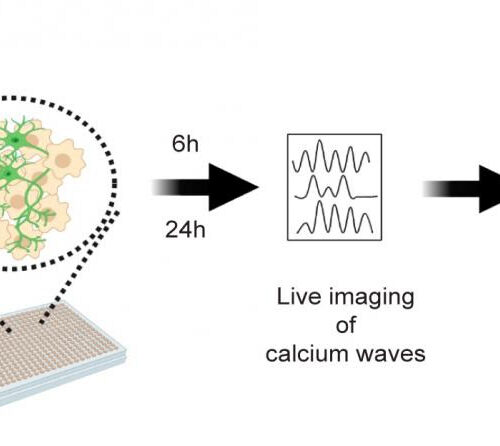by Helmholtz Association of German Research Centres In the cell culture experiment: Disrupted motor neurons of ALS patients are stimulated with magnetic pulses (coil top left) and regain their original performance. Motor neurons in healthy individuals send signals to the skeletal muscles. ALS, however, is currently an incurable, neurodegenerative disease in which motor neurons are severely...
Tag: <span>Motor Neurons</span>
Study identifies features that may make motor neurons vulnerable to ALS
by National Institutes of Health Credit: Neuron (2023). DOI: 10.1016/j.neuron.2023.01.007 New research offers clues about the biology of cells in the spinal cord that die off in amyotrophic lateral sclerosis (ALS) and other neurodegenerative diseases. A team of researchers supported by the National Institutes of Health has found evidence linking motor neurons’ large cell size and supporting...
How motor neurons develop into subtypes that activate different muscles
Motor neurons innervate the body; a study describes how a gene called Kdm6b helps these cells diversify into crucial subtypes. Motor neurons play a vital role in movement, linking the central nervous system with different muscles in the body. As such, scientists are very interested in understanding the biological mechanisms that control how these neurons form....
Motor neurons derived from patients point to new possible drug target for ALS
BOSTON CHILDREN’S HOSPITAL IMAGE: This high-throughput screening system is designed to identify compounds that decrease motor neuron hyperexcitability, a cardinal feature of ALS. Motor neurons derived from patients with ALS are cultured in 384-well plates, and compounds from chemical libraries of small molecules against known molecular targets are added after 3-4 weeks. Live GCaMP imaging,...
Scientists shed new light on neural processes behind learning and motor behaviours
by eLife Researchers have provided new insight into the neural processes behind movement and learning behaviours, according to a study published today in eLife. The findings in rats reveal how the cerebral cortex, which is responsible for processing information, affects the basal ganglia, which controls motor behaviours and reinforcement learning. This could pave the way...
Novel agent flips on garbage disposal in neurons, eliminating toxic brain proteins in mice
by Georgetown University Medical Center Neuroscientists at Georgetown University Medical Center say they have developed and tested an agent that reduces the buildup of toxic proteins in animal models of both Parkinson’s and Alzheimer’s diseases, and improves cognitive and motor behavior. The team will present their findings about the agent, CM101 (also known as BK40143),...
Alzheimer’s-associated tau protein disrupts molecular transport within neurons
Abnormal form of tau interacts with structure handling transport between nucleus and cytoplasm MASSACHUSETTS GENERAL HOSPITAL A multi-institutional study led by investigators at Massachusetts General Hospital (MGH) and Johns Hopkins School of Medicine has found how the abnormal form of tau that accumulates in the neurofibrillary tangles that characterize Alzheimer’s disease can disrupt the normal...
Human skin cells transformed directly into motor neurons
Scientists working to develop new treatments for neurodegenerative diseases have been stymied by the inability to grow human motor neurons in the lab. Motor neurons drive muscle contractions, and their damage underlies devastating diseases such as amyotrophic lateral sclerosis and spinal muscular atrophy, both of which ultimately lead to paralysis and early death. In new...
Study investigates how to turn stem cells into motor neurons
Stem cells can develop into many different types of cells, such as muscle cells, red blood cells, or neurons. Given their special regenerative ability, stem cells can be used to treat a wide range of diseases. A team of researchers uncovers new details involved in the process of turning stem cells into motor neurons....



